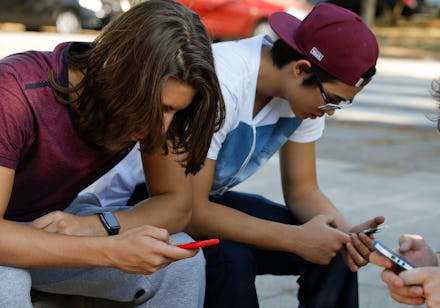Half of Teens Consider Themselves Cell Phone "Addicts," According to Survey

Forget climate change, ISIS and economic stagnation — here's something parents should supposedly really be worrying about: A new survey by media watchdog Common Sense Media seems likely to justify a lot of pearl-clutching from parents concerned that cell phones and iPads are turning their children into self-absorbed drones.
According to CSM, which conducted over 1,240 interviews with parents and their children, about 59% of parents think their kids are "addicted" to their cell phones. Precisely 50% of teenagers also admitted they felt like cell phone addicts.
While the survey was conducted over the phone, according to its section on methodology, addiction is a medical diagnosis — and survey respondents can't diagnose themselves. The statistic is clearly intended to tie into a review of the scientific literature posted on the CSM's website, which suggests digital lifestyles and multi-tasking are tied to changes in the brain, "lower empathy and social well-being" and even narcissism.
At times, CSM seems to lean towards a stereotypical (and scientifically unsupported) view of young people as technology-addled, self absorbed narcissists.
"Many researchers have noted that narcissism seems to be increasing, while empathic traits have been on the decline, and have pointed to social media as a driver for that change," CSM researchers wrote. "Arguments for why this would be the case are compelling: Time spent with media could subtract from face-to-face time, so heavy media users would forfeit opportunities to deepen empathy by conversing and learning from human facial and vocal cues."
But whether cell phone addiction is actually real or just an excuse to construct a pathology around media-friendly buzzwords remains a hotly debated topic in both clinical psychiatry and futurism in general. For example, Cyborgology's David Banks pushed back against prominent technology critic Sherry Turkle's premise of the "separation of physical and virtual selves." Banks wrote, "the privileging of one over the other is not only theoretically contradictory, but also empirically unsubstantiated."
"The relationships that we curate and maintain online through Facebook and other social media services are deeply anchored in offline interaction," Banks added.
The point? When people use mobile devices, they're often communicating with other people, which is not really addiction.
"Just because something is very important in your life, and you carry it everywhere, and when you forget it, you feel like your left arm's missing, that doesn't mean that you're addicted," Nottingham State University gambling expert Mark Griffiths told Digital Trends. "If it's not interfering with their job, or their education, or their relationships, or other hobbies, then we shouldn't be pathologizing them."
"Older adults may long for a different kind of social connectedness today," added PsychCentral's John Grohol. "Much like older adults in the 1920s longed for the horse-drawn carriage... Twenty years from now, the idea of 'smartphone addiction' will be just as quaint."
Read more: This Hack Might Help You Finally Turn Off Your Cell Phone
Even CSM seems to acknowledge "problematic media use" is not the same as actual addiction.
"Though it may be tempting to point to children's evolving technology- and media-related behaviors as evidence of new addictions, it is important to remember that true addictions reflect severe problems with very specific medical criteria," the authors of the review wrote. "We should not be so quick to point at children's use of technology as an addiction."
But by the time the message got to CNN, it had somehow turned into a scare story, complete with quotes about "teenage zombies who are glued to their phones," parenting bloggers saying intervention in cell phone use could prevent kids from becoming addicted to drugs in the future, and warnings that other countries classify internet addiction as a disorder. Because at the end of the day, the only thing people love more than their cell phones is worrying they love them too much: